TL;DR
- Real estate apps are transforming how people buy, sell, rent, and invest in properties through mobile-first solutions.
- Market growth is fueled by digital-first buyers (Millennials & Gen Z) and the rise of cross-border property investments.
- Essential features include smart search, virtual tours, interactive maps, secure payments, and AI-driven suggestions.
- Businesses face challenges like heavy competition, data security, and ensuring trust with verified listings.
- The future brings blockchain-powered transactions, eco-friendly home listings, and all-in-one super apps.
Introduction
The real estate industry is rapidly embracing digital transformation, with buyers and renters now relying heavily on mobile apps for property search, virtual tours, and transactions. This shift has created new opportunities for businesses to connect with tech-savvy users while streamlining processes for agents, investors, and landlords. Building a real estate app in 2025 requires the right mix of features, security, and user-focused design.
By working with an experienced Real Estate App Development Company, businesses can deliver solutions that stand out in a competitive market and tap into long-term growth.
What is Real Estate App Development?
Real estate app development is the process of designing, building, and deploying mobile applications that simplify property-related activities such as buying, selling, renting, and managing real estate. These apps act as a bridge between buyers, sellers, tenants, landlords, agents, and investors, offering a centralized platform that streamlines communication, transactions, and property discovery.
Unlike traditional methods, real estate apps provide real-time property listings, secure transactions, and AI-powered insights, making them indispensable tools for modern real estate businesses and consumers.
The development process typically includes:
- Identifying User Needs – Understanding whether your target audience is homebuyers, renters, agents, landlords, or investors. Each group requires different features, such as advanced search filters for buyers or rent management tools for landlords.
- Defining App Type – Choosing the right category (property marketplace, property management app, investment tracker, mortgage calculator, etc.) based on your business model.
- Designing the UX/UI – Creating an interface that builds trust, is visually appealing, and provides smooth navigation. For real estate apps, ease of use and credibility are critical since users make high-value decisions.
- Choosing the Right Tech Stack – Ensuring the app is secure, scalable, and future-ready with technologies like React Native or Flutter for frontend and Node.js or Django for backend. Security is especially important due to financial transactions and sensitive personal data.
- Developing and Testing an MVP – Starting with a Minimum Viable Product that includes core features like property search, listings, and user authentication. This allows businesses to validate their idea with real users before investing in advanced features like AI recommendations or AR/VR tours.
In short, real estate app development is about building digital platforms that enhance convenience, transparency, and trust in property transactions—while helping businesses expand reach and generate revenue.
Why Invest in a Real Estate App in 2025? (Market Size & Stats)
The real estate app market is expanding at an unprecedented pace, making 2025 an ideal time for businesses to step in. With convenience, speed, and transparency shaping buyer expectations, mobile-first platforms have become the go-to solution for property transactions.
- Mobile-First Property Searches – Over 70% of buyers begin their property journey on mobile apps, with higher engagement and conversions compared to traditional websites.
- Expanding Digital Market – The global real estate software industry is set to surpass $18 billion by 2027, driven by demand for smarter listings and secure digital transactions.
- Generational Shift – Millennials and Gen Z, accounting for nearly 64% of buyers in 2025, expect features like AI-driven recommendations and immersive virtual tours.
- Cross-Border Demand – International investors increasingly rely on apps to explore, evaluate, and purchase properties without geographical barriers.
- Tech-Driven Growth – AI, AR/VR, and blockchain adoption is projected to grow at 20% CAGR, enabling smarter searches, transparent deals, and enhanced user trust.
Key takeaway: In 2025, real estate apps are no longer optional—they’re essential for reaching wider audiences, unlocking revenue potential, and staying competitive in a digital-first property market.
Types of Real Estate Apps
Real estate apps come in various forms depending on their target users—buyers, renters, investors, property owners, or agents—and their business objectives. Each type is designed to simplify specific property-related tasks, from searching and purchasing to managing and marketing.
1. Property Search Apps
These apps, like Zillow or Realtor.com, cater to homebuyers and renters looking for properties. They allow users to browse listings using filters such as price range, property type, square footage, location, and amenities.
Key Features: High-resolution property photos, virtual floor plans, location maps, nearby schools and facilities, and direct contact options for property owners or agents.
Purpose: To make the property discovery and comparison process quick, visual, and user-friendly.
2. Real Estate Marketplaces
Marketplace platforms bring buyers, sellers, and real estate agents together in one ecosystem. They serve as an end-to-end solution for property transactions.
Key Features: Property listings, agent profiles, secure in-app messaging, payment gateways, property history, and review systems.
Purpose: To streamline the entire buying or renting journey from listing to final transaction within a single platform.
3. Property Management Apps
These apps are designed to manage multiple properties efficiently for landlords, property owners, and real estate agencies.
Key Features: Rent collection, automated reminders, tenant screening, maintenance request tracking, expense logs, and lease management.
Purpose: To centralize operational tasks and reduce administrative workload for property managers.
4. Real Estate Investment Apps
Investment-focused apps serve users who want to build and manage real estate portfolios.
Key Features: ROI calculators, rental yield estimations, property appreciation tracking, market analytics, and investment forecasts.
Purpose: To help investors make informed, data-driven decisions and maximize returns on their real estate assets.
5. Mortgage & Loan Apps
These apps simplify the financial side of real estate purchases. They help prospective buyers understand and plan their mortgage or loan obligations.
Key Features: EMI calculators, affordability checkers, interest rate comparison tools, pre-approval applications, and document submission portals.
Purpose: To make financing more transparent and accessible for homebuyers and borrowers.
6. Virtual Tour Apps
Powered by AR and VR technologies, virtual tour apps allow potential buyers or renters to experience properties remotely in a highly immersive way.
Key Features: 3D walk-throughs, panoramic views, virtual staging, and interactive room layouts.
Purpose: To save time, reduce physical visits, and enable faster decision-making by offering realistic property previews.
7. Brokerage & CRM Apps
These apps are tailored for real estate brokers, agents, and agencies to manage client relationships and sales pipelines.
Key Features: Lead tracking, automated follow-ups, marketing campaign tools, property listing integrations, and communication modules.
Purpose: To boost productivity, improve client management, and close deals more efficiently.
Most Essential Features of a Real Estate App
To stand out in a competitive market, a real estate app must provide features that deliver convenience, trust, and a smooth user experience. Below are the most critical features every successful app should include:
- Advanced Search & Filters – Users should be able to refine property searches using filters such as location, budget, property size, amenities, and availability. Smart filtering ensures that buyers and renters quickly find properties that match their preferences.
- High-Quality Photos & 360° Virtual Tours – Visual content is the backbone of property discovery. High-resolution images and immersive 360° tours or AR/VR experiences allow users to explore properties remotely and build trust before scheduling visits.
- Interactive Maps – Maps help users evaluate neighborhoods by displaying nearby schools, hospitals, transport hubs, crime rates, and commute times. This feature adds context to listings and improves decision-making.
- Favorites & Saved Searches – Allowing users to save properties or entire searches makes it easier to revisit options without starting from scratch, improving engagement and retention.
- Push Notifications – Timely updates about new listings, price reductions, or rental availability keep users engaged and encourage quicker actions.
- User Authentication & Secure Profiles – Profiles with secure logins (via email, phone, or social accounts) ensure trust and personalization. Verified accounts also reduce fraud and fake listings.
- In-App Messaging & Calls – Direct communication between agents, buyers, and property owners enhances transparency and speeds up decision-making. Some apps even include video calling for remote property discussions.
- Payment Gateway Integration – Secure payment options allow users to pay deposits, rental fees, or booking charges directly through the app, making transactions faster and more convenient.
- AI-Powered Property Recommendations – Artificial Intelligence analyzes user behavior and preferences to suggest relevant properties, increasing engagement and conversion rates.
- Market Insights & Valuation Tools – Features like property value estimators, neighborhood trends, and price history help buyers and investors make informed financial decisions.
5 Reasons to Invest in Real Estate Apps
Building a real estate app in 2025 is not just a tech trend—it’s a business necessity. Here are the key reasons why companies should consider investing in this growing sector:
- Growing Demand – A majority of property buyers and renters now begin their search online, with mobile apps leading the way. As smartphone penetration rises, users expect easy, on-the-go access to property listings, making real estate apps the preferred choice over traditional methods.
- Wider Business Reach – Unlike local brokers or offline listings, apps can connect businesses with global buyers, sellers, and investors. With features like multilingual support and cross-border property listings, companies can expand their reach beyond geographic boundaries.
- Enhanced Customer Experience – Real estate apps simplify the buying, selling, and renting process by offering advanced search, virtual tours, and instant communication. A seamless digital experience not only saves time for users but also builds trust and long-term customer relationships.
- Revenue Potential – Apps open multiple revenue streams, such as featured listings, premium subscriptions for agents, advertising opportunities, and transaction-based commissions. This makes real estate apps a sustainable and scalable business model.
- Competitive Advantage – Businesses that embrace digital-first real estate solutions stay ahead of traditional brokers. By leveraging AI, AR/VR, and data analytics, companies can differentiate themselves and build brand authority in a highly competitive market.
How to Make a Real Estate App (Step-by-Step)
Building a real estate app in 2025 goes far beyond just writing code—it’s about creating a secure, seamless, and value-rich platform that genuinely solves the pain points of buyers, sellers, renters, investors, and agents. Below is a clear, step-by-step roadmap to guide you from concept to launch and beyond.
1. Define Your Concept & Target Audience
The foundation of a successful real estate app lies in a clear vision. Start by defining what kind of problem your app will solve and who will use it.
- Target Users: First-time homebuyers, renters, landlords, real estate investors, or agencies.
- Example: An app for landlords would focus on lease management, rent collection, and tenant screening, while an investor-focused app might include ROI calculators and portfolio analytics.
- Goal: Narrowing your audience ensures you build relevant features instead of trying to serve everyone at once.
2. Conduct Market Research & Competitor Analysis
Understand the current market landscape before you start building. Research the leading platforms like Zillow, Redfin, Realtor.com, MagicBricks, and 99acres to learn what works and what users complain about.
- Study User Reviews: Identify gaps and pain points in existing apps.
- Analyze Business Models: Subscription, commission-based, or ad-driven monetization.
- Goal: Spot opportunities for innovation, find your niche, and build a competitive edge.
3. Plan Features & Choose the Tech Stack
Once you know your target users and competitors, list out your app’s must-have features.
- Basic MVP Features: Property search, smart filters, image galleries, geolocation, user accounts, and chat/messaging.
- Advanced Features (later stages): AI-based property recommendations, AR/VR virtual tours, price prediction engines, mortgage calculators, and secure payment gateways.
- Recommended Tech Stack:
- Frontend: React Native or Flutter (cross-platform)
- Backend: Node.js, Django, or Ruby on Rails
- Database: PostgreSQL, MongoDB, or Firebase
- Cloud Hosting: AWS, Google Cloud, or Firebase
- Goal: Prioritize essential features for launch and ensure your technology stack can scale as your user base grows.
4. Design an Intuitive UI/UX
A real estate app deals with big financial decisions, so trust and ease of use are crucial.
- UI Priorities: Clean design, modern color palette, and responsive layout.
- UX Priorities: Smooth navigation, simple onboarding, fast loading times, and credibility elements like verified badges and ratings.
- Goal: Reduce friction and build trust to improve user engagement and conversion rates.
5. Build the MVP (Minimum Viable Product)
Instead of launching a full-fledged app at once, start small and smart.
- Focus: Only the core features that directly serve your primary use case.
- Benefits: Faster time to market, lower initial costs, and early feedback from real users.
- Goal: Validate your concept before heavily investing in scaling and advanced features.
6. Test for Security, Performance & Scalability
Real estate apps often handle confidential data and financial transactions, so reliability is critical.
- Security: Use end-to-end encryption, two-factor authentication (2FA), and secure payment integrations (Stripe, PayPal).
- Performance: Test app speed, image loading times, and data synchronization.
- Scalability: Simulate heavy user traffic to ensure the app can handle future growth.
- Goal: Ensure the platform is safe, stable, and future-ready before going public.
7. Launch & Promote the App
With your app tested and stable, it’s time to go live and attract users.
- Distribution: Deploy on iOS App Store, Google Play Store, and optionally a web app.
- Promotion Strategies:
- App Store Optimization (ASO)
- Social media marketing campaigns
- Partnerships with real estate firms and agents
- Referral incentives or sign-up bonuses
- Goal: Build brand visibility and acquire early users who can provide valuable feedback.
8. Maintain, Update & Scale with New Tech
Launching is just the beginning—consistent improvement keeps your app competitive.
- Monitor: Use analytics tools (Mixpanel, Google Analytics) to track user behavior.
- Update: Regularly fix bugs, improve UX, and add user-requested features.
- Innovate with Advanced Tech:
- AI: Personalized property suggestions, price predictions
- AR/VR: Immersive 3D virtual property tours
- Blockchain: Tamper-proof property records and smart contracts
- Goal: Keep the app modern, secure, and aligned with market trends.
Quick Read: How to Make a Social Media App: Features, Process & Cost
Key Challenges in Real Estate App Development
Building a real estate app is an exciting opportunity, but it comes with significant challenges that businesses must address to ensure long-term success.
- Heavy Market Competition
The real estate app market is highly saturated with big players like Zillow, Redfin, Realtor.com, and regional giants like MagicBricks or 99acres. To stand out, new apps must deliver unique features, niche-focused solutions, or superior user experiences. Without clear differentiation, gaining user trust and market share is difficult. - Data Privacy & Security Concerns
Real estate apps handle sensitive data—personal identification, property ownership documents, and financial transactions. A single data breach can damage credibility. Robust encryption, GDPR/CCPA compliance, two-factor authentication, and secure payment integrations are essential to protect users and build trust. - High Development & Maintenance Costs
Adding modern features like AI-driven property recommendations, AR/VR virtual tours, and blockchain-based smart contracts can be expensive. Businesses need to plan budgets carefully, starting with an MVP and scaling gradually to avoid overspending. - Building & Maintaining User Trust
Fake listings, unverified agents, and fraud are common pain points in real estate platforms. To build credibility, apps must introduce strict verification processes, user reviews/ratings, escrow-based payments, and AI-driven fraud detection. Establishing transparency directly impacts adoption rates.
Recommended Tech Stack for Real Estate App Development
Choosing the right technology stack is one of the most important decisions in building a scalable, secure, and feature-rich real estate app. The stack should support fast performance, smooth integrations, and long-term scalability. Below is a recommended breakdown:
- Frontend (User Interface): React Native, Flutter
For mobile app development, cross-platform frameworks like React Native and Flutter allow developers to build apps for both iOS and Android using a single codebase. This reduces cost and time-to-market while ensuring a smooth, native-like user experience. - Backend (Server-Side): Node.js, Django, Ruby on Rails
The backend powers the app’s functionality, including property listings, authentication, messaging, and transactions. Node.js is ideal for real-time interactions (like chat or notifications), Django offers security-focused development, while Ruby on Rails speeds up MVP launches with its rapid prototyping capabilities. - Database: PostgreSQL, MongoDB, Firebase
A reliable database is crucial for managing property listings, user profiles, and transactions. PostgreSQL provides strong relational data management, MongoDB is great for handling unstructured data like images or documents, and Firebase offers real-time database capabilities with seamless cloud syncing. - Maps & Geolocation: Google Maps API, Mapbox
Location is everything in real estate. Integrating Google Maps API or Mapbox allows users to view properties on maps, calculate commute times, and explore nearby amenities like schools, hospitals, or restaurants. - Payments & Transactions: Stripe, PayPal, Razorpay
For deposits, bookings, and subscription payments, integrating secure payment gateways is essential. Stripe and PayPal are widely used globally, while Razorpay is a strong option for Indian and Asian markets. - Cloud Hosting & Scalability: AWS, Google Cloud, Azure
Cloud platforms like Amazon Web Services (AWS), Google Cloud, and Microsoft Azure ensure high availability, scalability, and security. They also provide built-in tools for AI, data analytics, and content delivery, which are critical for growing apps. - AI, AR/VR & Emerging Tech: TensorFlow, OpenAI API, ARKit, ARCore
AI tools like TensorFlow and OpenAI APIs help with personalized recommendations, property valuations, and chatbot support. ARKit (iOS) and ARCore (Android) power immersive 3D virtual tours, allowing buyers to explore homes remotely in a realistic way.
How Much Does It Cost to Develop a Real Estate App in 2025?
The cost of developing a real estate app in 2025 isn’t fixed—it depends on several factors such as app type, features, design complexity, and development region. A basic property search app will require fewer resources compared to a full-featured platform that includes AI recommendations, AR/VR property tours, or integrated mortgage tools.
Some of the main factors influencing cost include:
- App Type & Scope – From search platforms to property management tools, the type of app shapes the overall budget.
- Feature Set – Adding advanced features like virtual tours, chat integrations, or AI-driven insights increases development time and investment.
- Tech Stack & Platform – Choosing between native apps or cross-platform frameworks affects both speed and cost.
- Security & Scalability – Apps handling sensitive financial and personal data need extra measures for compliance and performance.
Since every project has unique requirements, many businesses prefer using an App Development Cost Calculator to free a ballpark estimate of budgets more accurately. It helps break down costs based on chosen features, platforms, and scope, making planning much easier before development begins.
Real Estate App Development Success Stories
Looking at successful real estate apps gives valuable insights into how digital platforms can transform property buying, renting, and investing. Some notable examples include:
Zillow & Realtor.com – These platforms transformed the way people search for homes by offering advanced filters, property valuations, and direct connections with agents. They set the standard for digital-first property discovery.
Redfin – Stood out by blending property search with professional in-house agent services, making the process more transparent and trustworthy for buyers and sellers.
Airbnb – Proved the power of niche-focused real estate apps by turning vacation rentals into a global business model, reshaping how people travel and invest in short-term stays.
StayNest (fictional example) – A short-term rental app that highlights how even emerging platforms can succeed by targeting very specific user needs in the property market.
Future of Real Estate Apps in 2025 & Beyond
AI-Powered Search – Artificial intelligence will make property recommendations hyper-personalized, learning from user preferences, browsing behavior, and budget to suggest the most relevant options.
AR/VR Virtual Tours – Augmented and virtual reality will allow buyers and renters to explore properties remotely in immersive 3D, reducing site visits and speeding up decision-making.
Blockchain Transactions – Blockchain will ensure secure, transparent, and fraud-proof deals by enabling smart contracts, digital identities, and tamper-proof property records.
Green & Smart Home Listings – With sustainability becoming a priority, apps will highlight energy-efficient, eco-friendly, and smart homes that appeal to environmentally conscious buyers.
Super Apps – The next evolution of real estate apps will be “all-in-one” solutions that integrate property search, mortgage pre-approvals, payments, investment tracking, and property management in a single ecosystem.
Conclusion
Real estate app development in 2025 presents vast opportunities for businesses to meet the needs of modern property buyers, sellers, and investors. With advancements like AI, AR/VR, and blockchain, apps are becoming smarter, more transparent, and user-friendly. While competition and integration challenges exist, focusing on user experience and secure technology can make a real difference. To get a clearer picture of your potential investment, tools like an App Development Cost Calculator can help you plan realistically. Building the right solution today can set the foundation for long-term success in the evolving real estate market.
FAQs
Q1. How long does it take to build a real estate app?
Between 4–9 months, depending on features and complexity.
Q2. How do real estate apps make money?
Through premium listings, ads, subscriptions, commissions, and partnerships.
Q3. What trends will dominate in 2025?
AI-based search, AR/VR property tours, blockchain-secured transactions, and sustainable property listings.
Q4. Can small businesses compete with big players like Zillow?
Yes—by targeting niches (vacation rentals, regional markets, student housing) or offering unique features.
Q5. What’s the first step in developing a real estate app?
Start by defining your target audience and app type, then build an MVP before scaling.


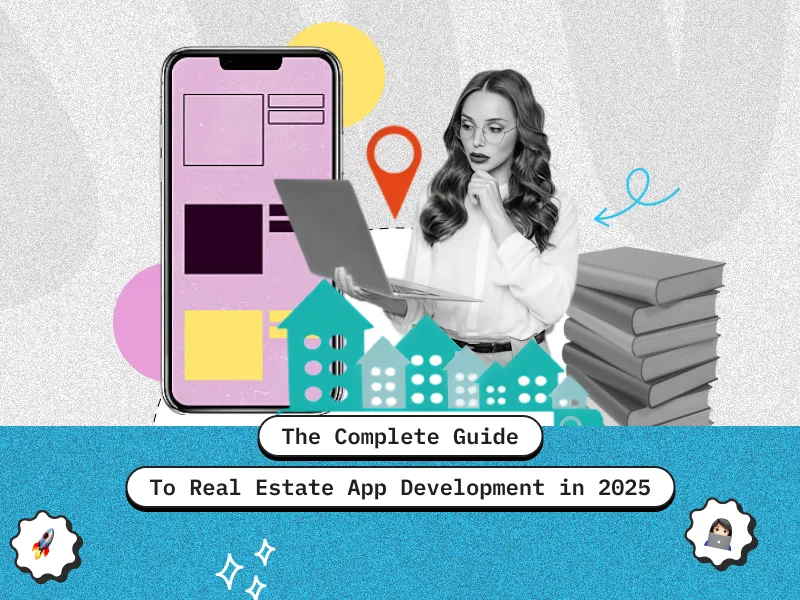



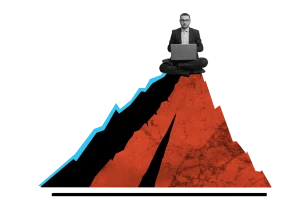




 30 mins free Consulting
30 mins free Consulting 
 12 min read
12 min read 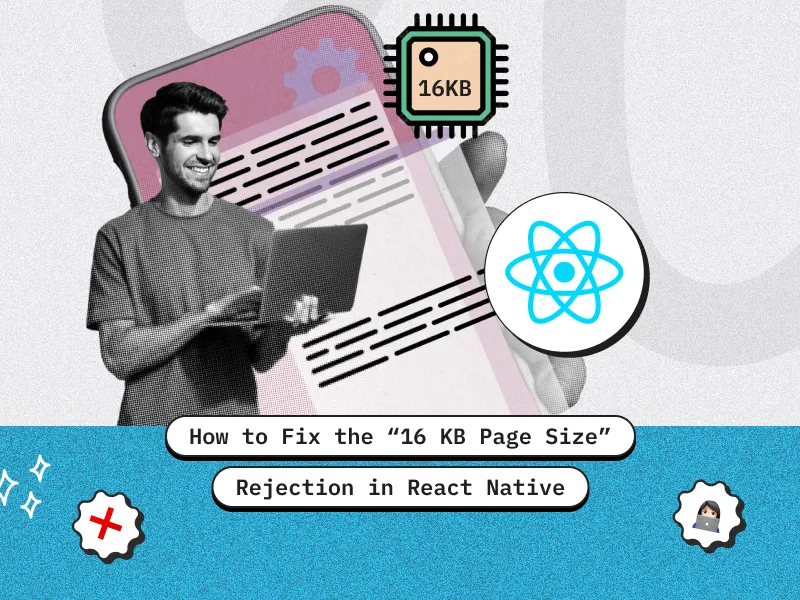
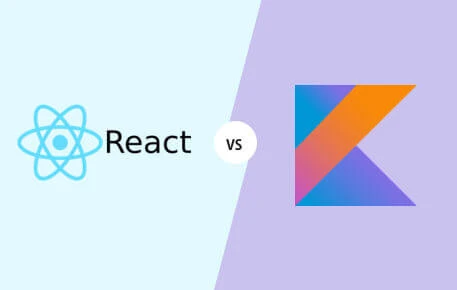
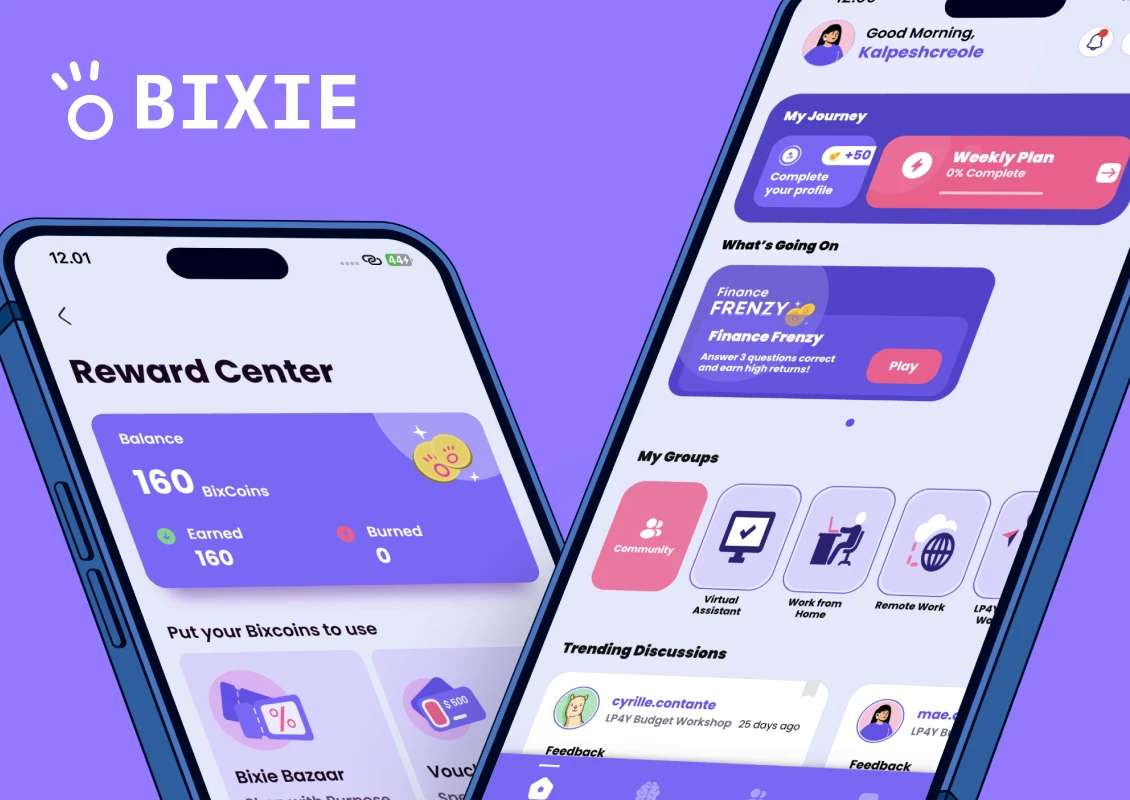
 Singapore
Singapore 
 USA
USA 
 Finland
Finland 





 Love we get from the world
Love we get from the world 